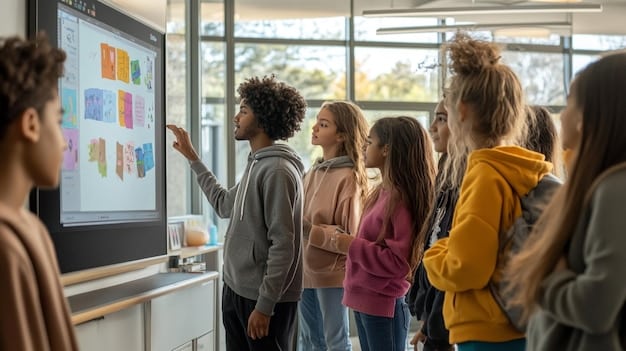Metacognition in Gen Z Learning: Strategies for Academic Performance

Metacognition significantly influences Gen Z’s learning outcomes by empowering students to understand and regulate their cognitive processes, directly impacting academic performance through enhanced self-awareness and strategic learning approaches.
In an increasingly complex educational landscape, understanding how students learn is as crucial as what they learn. For Gen Z, a generation that has grown up with unprecedented access to information, the ability to effectively process, retain, and apply knowledge hinges significantly on their metacognitive skills. This article delves into the role of metacognition in Gen Z’s learning: insider strategies for improved academic performance, offering practical insights and actionable methods to enhance these vital cognitive abilities.
Understanding Metacognition: The Foundation of Smart Learning
Metacognition, often described as “thinking about thinking,” is a cognitive process that involves being aware of, understanding, and actively controlling one’s own learning. For Gen Z, who navigate vast amounts of digital information daily, developing strong metacognitive skills is not just beneficial—it’s essential for distinguishing between information overload and genuine knowledge acquisition.
This includes knowing what you know, what you don’t know, and what strategies you can employ to fill those gaps. It means recognizing when a learning strategy isn’t working and having the flexibility to pivot to a more effective one. Ultimately, metacognition transforms passive learners into active, strategic thinkers with greater control over their academic destinies.
The Two Pillars of Metacognition
Metacognition is typically broken down into two main components. Understanding these helps students identify specific areas for development.
- Metacognitive Knowledge: This refers to what learners know about themselves as learners, about the task at hand, and about the strategies they can use. It’s the declarative knowledge of how one’s own mind works.
- Metacognitive Regulation: This involves the active monitoring and consequent adjustment of learning. It’s the procedural knowledge—how to plan, monitor, and evaluate one’s learning process.
Both aspects work in tandem, allowing students to become more efficient and independent learners. Without metacognitive knowledge, students might not even be aware of the range of learning strategies available. Without metacognitive regulation, they might struggle to apply those strategies effectively or adapt them when necessary.
Emphasizing these pillars early in a student’s academic journey can lead to significant long-term benefits. It moves beyond rote memorization, fostering a deep understanding and a critical approach to learning that serves them far beyond the classroom.
In essence, metacognition is the internal GPS for learning. It provides students with the self-awareness and control needed to navigate academic challenges successfully, particularly crucial for Gen Z who often learn in dynamic, self-directed digital environments.
Gen Z’s Unique Learning Landscape and Metacognitive Needs
Born between the mid-1990s and early 2010s, Gen Z is the first generation to grow up entirely in the digital age. This pervasive digital integration shapes their learning preferences and presents unique challenges and opportunities for metacognitive development. They are digital natives, often adept at multitasking and accustomed to immediate access to information.
However, this constant connectivity can also lead to shorter attention spans and a reliance on external information sources rather than internal reflection. Consequently, the need for robust metacognitive skills is amplified, allowing them to filter, evaluate, and critically engage with knowledge rather than merely consuming it passively.
Navigating Digital Distractions and Information Overload
The ubiquity of smartphones and social media means Gen Z learners are constantly bombarded with notifications and digital stimuli. This environment, while offering unparalleled access to resources, often hinders deep, focused work—the very kind required for effective metacognition. Students need to develop the metacognitive ability to recognize when they are distracted and implement strategies to regain focus.
- Digital Self-Regulation: Learning to consciously disconnect or set boundaries for digital usage during study times. This means understanding the impact of notifications on concentration.
- Information Appraisal: Developing critical thinking to evaluate the credibility and relevance of online information, rather than accepting it at face value. This metacognitive skill is vital in an era of misinformation.
These skills are not innate; they must be explicitly taught and practiced. Educating students on the neuroscience of distraction and the benefits of deep work can motivate them to cultivate conscious digital habits. Educators play a crucial role in modeling and reinforcing these behaviors.
Gen Z’s comfort with technology also means they often prefer interactive, visual, and personalized learning experiences. Metacognitive strategies that leverage these preferences, such as self-assessment tools embedded in online platforms or interactive visualizations that prompt reflection, can be particularly effective. Recognizing their learning preferences and integrating metacognitive prompts within these frameworks can significantly boost their engagement and academic performance.

In summary, while Gen Z’s digital fluency offers advantages, it necessitates a heightened awareness of how information is processed and regulated. Metacognition provides the framework for this awareness, enabling them to thrive in a technologically saturated world.
Insider Strategies for Cultivating Metacognition
Empowering Gen Z with metacognitive skills requires a deliberate and integrated approach within educational settings. These strategies move beyond simplistic study tips, focusing instead on fostering genuine self-awareness and strategic learning.
Strategy 1: Promoting Self-Questioning
One of the most effective ways to ignite metacognition is by encouraging students to ask themselves questions before, during, and after learning tasks. This externalizes their internal cognitive processes, making them more aware of their understanding and areas of confusion.
- Before Learning: “What do I already know about this topic?” “What do I expect to learn?” “What’s my goal for this study session?”
- During Learning: “Am I understanding this?” “Does this make sense?” “What’s the main idea here?” “How is this related to what I already know?”
- After Learning: “What did I learn?” “How could I explain this to someone else?” “What parts are still unclear?” “What strategies worked well for me?”
Teachers can model these questions explicitly and integrate them into assignments or class discussions. Providing prompts and requiring students to articulate their thought processes can help solidify this habit. This intentional questioning fosters a more active engagement with the material, shifting from passive reception to active construction of knowledge.
Strategy 2: The Power of Self-Regulation and Monitoring
Metacognition thrives when students are taught to actively monitor their comprehension and adjust their learning strategies accordingly. This involves developing a keen awareness of their own learning process in real-time.
For example, if a student is reading a complex text and realizes they are not absorbing the information, a self-regulated learner would pause, identify the issue (e.g., distraction, unfamiliar vocabulary), and implement a corrective strategy (e.g., re-reading, looking up words, taking notes, moving to a quieter environment). This continuous feedback loop is fundamental to effective learning.
Techniques such as “traffic light” check-ins (green for clear, yellow for somewhat clear, red for struggling) or journaling about their learning challenges can help students track their understanding and develop this crucial skill. These tools provide tangible ways for students to reflect on their learning journey.
Encouraging students to set specific, measurable goals for each study session and then reflect on whether those goals were met further strengthens their self-regulation abilities. This process not only improves academic outcomes but also builds resilience and problem-solving skills, which are invaluable beyond academics.
Integrating Metacognition into Classroom Practices
For metacognitive strategies to truly take root, they must be seamlessly integrated into daily classroom activities, not treated as isolated add-ons. This requires educators to shift their pedagogical approach to explicitly teach and reinforce metacognitive habits.
Fostering a Culture of Reflection
Creating classroom environments where reflection is valued and encouraged is paramount. This goes beyond simply asking “What did you learn today?” but delves into “How did you learn it?” and “What challenges did you face and how did you overcome them?”
Teachers can incorporate regular reflection prompts, discussions, and journals into their lessons. For example, after a challenging problem, students could discuss what strategies they tried, which ones worked, and why. This debriefing process normalizes struggle and emphasizes the learning process over just the final answer.
Modeling reflective thinking aloud is also powerful. When teachers verbalize their own thought processes or problem-solving strategies, they provide students with a concrete example of metacognition in action. This makes the abstract concept of “thinking about thinking” more accessible and imitable.
Teaching Specific Metacognitive Strategies Explicitly
While some students may intuitively employ metacognitive skills, most benefit from explicit instruction. This means dedicating time to teach specific strategies and explaining their purpose.
- Planning and Goal Setting: Guide students to break down large assignments into smaller, manageable steps and set clear learning objectives.
- Monitoring Comprehension: Teach techniques like summarizing sections of text, concept mapping, or teaching the material to a peer to check for understanding.
- Evaluating Effectiveness: Encourage students to assess their performance on quizzes or assignments not just for the grade, but to pinpoint where their learning strategies succeeded or failed.
Providing students with a “toolkit” of metacognitive strategies empowers them to choose the most appropriate tool for a given learning situation. Regular practice and feedback are key to internalizing these strategies, transforming them from external prompts into ingrained habits.

By creating a classroom culture that values inquiry, critical thinking, and self-awareness, educators can significantly enhance Gen Z’s metacognitive abilities, preparing them not just for academic success but for lifelong learning.
Overcoming Challenges in Metacognitive Development for Gen Z
While the benefits of metacognition are clear, fostering these skills in Gen Z comes with its own set of challenges. Addressing these obstacles head-on is crucial for successful implementation of metacognitive strategies.
Addressing the “Instant Gratification” Mindset
Gen Z, having grown up in a world of instant information and immediate feedback, may struggle with the patience and sustained effort required for deep metacognitive reflection. The iterative process of planning, monitoring, and evaluating can feel slow or cumbersome when compared to quick search engine results.
Educators must help students see the long-term value and efficiency gains that metacognition offers. This can involve showcasing success stories of peers who use these strategies or framing metacognitive practice as a “power-up” for faster, more effective learning in the long run. Emphasizing mastery over speed can help shift this mindset.
Small, incremental steps and immediate, supportive feedback are also vital. Breaking down metacognitive tasks into manageable chunks can prevent students from becoming overwhelmed and reinforce the idea that reflection is a continuous process, not just a one-time event.
The Role of Technology: Friend or Foe?
Technology’s double-edged sword effect is particularly pronounced in metacognitive development. While digital tools can offer powerful platforms for reflection and self-assessment, they can also perpetuate a superficial engagement with content.
- Leveraging Technology for Good: Utilize educational apps and online platforms that build in metacognitive prompts, such as spaced repetition software that asks for confidence ratings after answers, or interactive simulations that require planning and evaluation.
- Mitigating Distractions: Teach responsible tech use, including strategies for minimizing digital distractions during study time. This can involve using website blockers, turning off notifications, or designating “tech-free” study zones.
The goal is not to eliminate technology, but to teach students to wield it strategically. By consciously integrating metacognitive practices into their digital learning habits, Gen Z can transform potential distractions into powerful allies for academic growth.
Another challenge lies in student buy-in. If metacognition is presented as just another “thing to do,” students may resist. Framing it as a path to greater independence, reduced stress, and ultimately, better academic performance, can increase engagement. Showing them how these skills apply not just in school but in future careers and life helps solidify their perceived relevance.
By openly acknowledging and addressing these challenges, educators can create targeted interventions that make metacognitive development both accessible and appealing to Gen Z learners.
Measuring and Sustaining Metacognitive Growth
For metacognitive strategies to be truly effective, their impact needs to be observable and measurable. This allows both students and educators to track progress and make necessary adjustments. Sustaining these gains requires consistent reinforcement and integration into the learning culture.
Assessing Metacognitive Skills
Direct assessment of metacognition can be challenging as it involves internal cognitive processes. However, various methods can provide valuable insights:
- Think-Aloud Protocols: Asking students to verbalize their thoughts while solving a problem or reading a text can reveal their metacognitive strategies (or lack thereof).
- Self-Report Questionnaires: Surveys that prompt students to reflect on their learning processes, planning strategies, and self-monitoring habits can offer quantitative data.
- Observation and Anecdotal Records: Teachers can observe students’ approaches to tasks, how they handle errors, and their ability to articulate their learning process.
Feedback tailored to specific metacognitive behaviors, rather than just academic outcomes, is vital. For example, instead of just saying “good job,” a teacher might say, “I noticed you revised your approach after hitting a roadblock, which shows great metacognitive flexibility.”
Creating a Culture of Continuous Improvement
Metacognitive development is not a one-time event but an ongoing journey. Sustaining growth requires a consistent emphasis on reflective practice and a classroom environment that celebrates learning from mistakes.
Regular check-ins, peer discussions focused on learning strategies, and opportunities for students to revise their work based on self-assessment are all crucial. This reinforces the idea that learning is iterative and that improving one’s learning process is as important as mastering content.
Furthermore, connecting metacognitive skills to real-world applications helps solidify their relevance for Gen Z. Discussing how athletes plan and reflect on their performance, or how entrepreneurs adapt their strategies based on market feedback, can make the concepts more tangible and motivating.
Ultimately, the goal is for metacognition to become an internalized habit, enabling Gen Z learners to navigate increasingly complex challenges throughout their academic and professional lives. By systematically measuring progress and cultivating a supportive, reflective learning environment, educators can ensure these vital skills continue to develop and flourish.
The long-term value of strong metacognitive abilities extends far beyond test scores. It equips individuals with the capacity for lifelong learning, adaptability, and critical thinking—qualities that are indispensable in a rapidly changing world. For Gen Z, mastering metacognition is not just about better grades; it’s about building the fundamental mental tools for future success and well-being.
| Key Metacognitive Strategy | Brief Description |
|---|---|
| 💡 Self-Questioning | Asking “what,” “how,” and “why” questions before, during, and after learning tasks to enhance comprehension and awareness. |
| 🔍 Self-Regulation & Monitoring | Continuously checking understanding and adjusting learning strategies in real-time based on progress. |
| 🗓️ Planning & Goal Setting | Breaking down complex tasks and setting clear, measurable objectives for effective study and learning sessions. |
| 🔄 Reflective Practice | Regularly evaluating the effectiveness of learning methods and making adjustments for continuous improvement. |
Frequently Asked Questions About Metacognition & Gen Z
Metacognition is essentially “thinking about your thinking.” It’s the ability to be aware of how you learn, to understand your own cognitive strengths and weaknesses, and to consciously control your learning strategies. For example, knowing that re-reading doesn’t work for you and trying a different method is metacognition in action.
Gen Z grew up with constant digital stimulation, which can lead to information overload and shorter attention spans. Metacognition helps them navigate this by enabling critical evaluation of information, better focus management, and effective self-regulation in their tech-rich learning environments, moving beyond passive consumption to active engagement.
Educators can promote metacognition by teaching explicit strategies like self-questioning, encouraging reflection through journaling, modeling their own thinking process, and providing opportunities for students to set goals and monitor their progress. Creating a classroom culture that values inquiry and flexible learning approaches is also key.
Yes, directly. By becoming more aware of their learning processes, students can identify ineffective study habits and switch to more productive ones. This leads to more focused learning, better comprehension, improved problem-solving skills, and ultimately, higher academic achievement across various subjects.
A common misconception is that metacognition is only for gifted students or that it’s just about “studying harder.” In reality, it’s about “studying smarter” and is a learnable skill for anyone. Another myth is that it happens automatically; it requires deliberate practice and explicit teaching to develop effectively.
Conclusion
The journey towards fostering robust metacognitive skills in Gen Z is not just an academic endeavor; it’s an investment in their future. By empowering them to “think about their thinking,” we equip them with the self-awareness, adaptability, and strategic approaches necessary to thrive in an ever-evolving world. These insider strategies, ranging from self-questioning to active self-regulation, transcend traditional learning methods, transforming students into independent, resilient learners. As educators and mentors, our role is to champion this critical cognitive development, ensuring that Gen Z not only achieves academic excellence but also cultivates the lifelong learning habits essential for success in all facets of life.